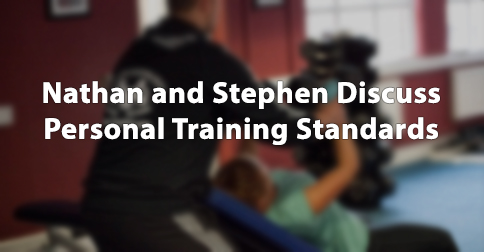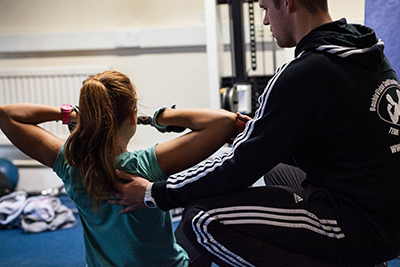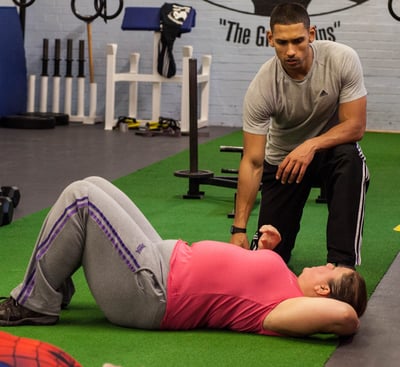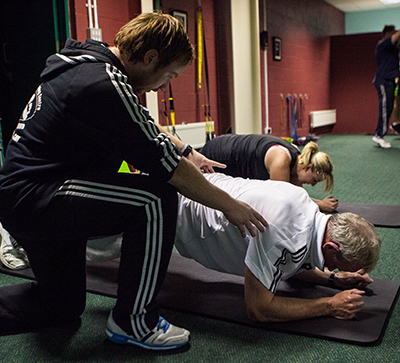
Nathan: Hi, I’m Nathan from the DVCC, I am here with Stephen, one of the founders of the DVCC, Stephen how are you?
Stephen: I am great, thanks Nathan.
Nathan: Today we’re going to be discussing personal training standards, and what makes a good personal trainer. So Stephen, in your opinion, what makes a good personal trainer?
Stephen: Well it’s quite a broad question Nathan, thanks for that! But I guess – and this is obviously only my opinion, I have got a fair amount of experience – but I think potentially there are quite a few things that make someone a good trainer.  And someone to get great results from the clients that they are training, I think that is ultimately what they are looking to do most of the time.
And someone to get great results from the clients that they are training, I think that is ultimately what they are looking to do most of the time.
I think passion is probably number 1: so the real desire, so that you actually want to learn more; because one of the keys I think is that you are never going to know everything, you have got to have that desire to constantly learn to improve and to get to know, because people can be quite different and the passion needs to rub off on to that client that is being trained.
Everyone has bad days; you, as a client, you are going to go through times when you are not really seeing progress, you’re finding it hard, work is busy and things; but to go and spend time with someone who is passionate about what they are doing and can transfer that positive energy,
I think is really important; and it makes it more enjoyable as well, it makes you more likely to want to actually turn up. I think with the results, part of it is actually just turning up, just making the effort to do it, you know?
You’re not going to see progress every single day, or sometimes you’re not going to see the progress you want to see, we all want to see faster progress. But if you just make it, you are going to turn up because that person is passionate, you can see they truly want to see you succeed; they care about you.
You tell me, because obviously you’re an amazing transformation expert, an amazing experience manager, what, for you, would be kind of one of those things that makes you… I mean you obviously care about people’s results, but how important do you think that is?
Nathan: I think it is super important, caring about people and I think what stems from that is being present, which is not what you see from a lot of other personal trainers.
I have been to various gyms over my time and I am sure you have, and I have seen various trainers not paying as much attention to their client as they should do, so I think by really caring about your client, you’ll get that, also being present and being focused on what’s happening at hand and giving your whole undivided attention to them. I think that is something that is very big as well.
Stephen: Yes I would agree, and I think a lot of the time it’s that thought; so being present is that thought, about that person who is being trained and the thought process behind it so that you’re not just going through the motions, I think, and just standing there, maybe you’re on your phone or doing something completely different, but you’re not really truly present, you’re not there with that client.
Nathan: And clients would pick up on that; I would think I could know. I’ve been in a supermarket before, for example, and someone has not been present and it did not make me feel good about what I was doing, so I would never want one of our clients at the DVCC, or a client anywhere, to feel that they are not being looked after properly.
Stephen: You know what, you say that you’d expect people to know that? I think yes, perhaps people do, but the standards – so we’re actually talking about standards here – the standard level is lower than that, it’s not that; so if you expect that’s what the standards should be, then you accept it.
I look at it as – mobile phone companies: you expect it to be painful when you’re on the phone to them, it’s going to be a hassle, they’re not going to answer your questions and you are going to sit on hold for 15 minutes before you speak to anyone; you know it’s not going to be fun to deal with – and you expect that because that’s what you think is standard.
The moment someone comes in that doesn’t do that, breaks the trend, then suddenly you realise it doesn’t have to be that way. And I think the fitness industry in general, there is that thought process that it’s acceptable for … I used the same phone example but you see it a lot…
...for you to be on your phone whilst you’re training someone, whilst they are under your care.
Now you know the things we put in place to make sure that everyone is, first and foremost, going to be safe; it is no good training hard if you’re not going to be safe, because it is going to put you back in the long run anyway. And yes I think it’s just that general lowering of level of standards, so that people think that is just the way it is.
Nathan: I think it’s very easy to become a personal trainer in this time and age; you can do very very quick courses these days.
I felt, when I first qualified as a PT, that I was going to be an amazing PT straight away, and what I found was at the time that I had to really develop a certain set of skills which I’ve learnt through the DVCC, which has changed me immensely.
Stephen: Which is why we actually set up, what we call internally, the DVCC University, where everyone is constantly learning, going through curriculum, taking tests and things like that, because it’s that attitude that we don’t know everything that is super important.
And like you said, the general standard and general education is poor and it is low; that’s fine as long as the first course that someone does is literally the beginning of their whole learning, they are constantly learning. 
One of the DVCC core values we have within our team is that we learn, we constantly learn every day; we are here after, just doing some training aren’t we?
And I think that is super important and I think, yes, there are a lot of different things with the standards of - generally - fitness, it is just the general thought process that the standard is low, so that people would accept someone training, phoning them or texting them five minutes before, saying “I’m ill, I can’t come in”.
That’s ok apparently, that’s the way it’s ok, because that’s what people see as a standard. They don’t put it alongside other types of, I guess, business or other services, other things that they actually do, they use. So they don’t correlate it or contrast it. Which I think is wrong; we always talk about wanting to really compare favourably – and we don’t get it right all the time, but we are constantly trying to improve and get better and better, and be compared against someone that is not fitness related service, completely different.
Nathan: I think another thing that is quite important is not to be too… a lot of PTs, when I have heard them in the past, have been very big headed about themselves and what they can lift and how much they know; and they’ve been giving their client maybe too much information in terms of using very scientific words that the client is not going to understand.
So being able to break it down into terms that your client is going to be able to understand, I think that’s very important.
Stephen: Yes and I have always felt that the sign of someone who knows something truly is that they’re comfortable talking to you on a basic level and explaining something on a basic level.
Whereas when you spend time with someone who just wants to throw out big words, I always tend to think that they don’t truly know their subject that well.
Nathan: And a lot of PTs do do that.
Stephen: Another one you touched on is that we try at the DVCC to be literally all about the results of our clients and about our clients; we want them to feel comfortable and to know that we’re not…
...What happens in the industry is that people want to make it about themselves, so whenever you see someone on their Facebook page, they are talking about themselves or they are doing things about themselves.
We get judged and we track this don’t we, on the results of our clients, literally, and how well we are doing at making people feel better about themselves, confidence wise, losing body fat and things like that – and that’s how we should be judged, not by how we look and that sort of thing.
Nathan: I also think that it’s super important for a personal trainer to train and to know the intensities of training; because I am sure that there are a lot of personal trainers out there who don’t train as they probably should do. I think when you don’t partake in any physical activity, it is very hard for you to gauge how hard someone is working and to push them to their limits that you want to push them to
Stephen: I agree, which is why we do our training every week on Monday; but equally I also think that, added to that, it’s very easy for trainers – and they tend to start at a younger age and that sort of thing and have lived a fit life – and sometimes it can be hard for someone to put themselves in the mindset of the people that they are truly training. I’ve noticed and I think that we are a lot better at this now; certainly we talk about it a lot, is realising that.
I am completely different to how I was 10 years ago; my shoulders hurt from rugby and I have to do different things. I have said this to you and I have said this; we are constantly talking about people… I’m going to feel different when I am 45, I am going to be different, so I would expect someone that is training me to understand that and not to try and make me do things that they think they can do, so why should I not be able to do it, because I can’t.
We’re both men and I am not that much older than you, but my life has been different to yours; my shoulders are different, I can’t necessarily… I
...f you were to treat me the same as you, then I would be in pain and I’d be hurt; I would feel bad that I can’t do it because of my limitations, so I think putting yourself into the mindset of the person you are training is super important; I don’t think people do that enough, I think they just think “If they’re not in pain” because I wouldn’t be in pain or that sort of thing, I think that’s just a poor attitude.
You’re never going to do it perfectly, but try to understand where that person is coming from.
 Nathan: Going back to care, I think care is super important; if a client ever injures themselves or ever says that they’re having a problem, for example, with their elbow; you always want to address that in the right way, you always want to make sure that you reinforce that you have heard that with a client.
Nathan: Going back to care, I think care is super important; if a client ever injures themselves or ever says that they’re having a problem, for example, with their elbow; you always want to address that in the right way, you always want to make sure that you reinforce that you have heard that with a client.
And again, a lot of PTs, if they have a client who comes in and says I might have injured myself, can completely dismiss that, I’ve seen that happen before. I think it’s very important to address the situation and if you don’t know what is best to do there and then, you tell the client and then you go away and find out.
I think a lot of PTs will try and think on their feet and come up with something which necessarily isn’t always going to be the best thing for the client.
Stephen: I agree and, there’s plenty we could talk about but I don’t think we’ll get into it today, but just about that safety side of things is the way that I think often a trainer can say, “This is the exercise you’re doing; there you go, go ahead and do 15 of those”.
But so someone knows, if you’re ever going to choose a trainer, that trainer should be literally cueing you continuously, “Chest out, back straight… great work Nath, you’re doing it right”. Even when you are doing it right, you should be being cued, because the moment you do it wrong is the moment you hurt yourself.
Nathan: And also I have just thought of another one actually; not programming properly. The amount of times I’ll see somebody in a gym and they’re not marking down how many repetitions, and you can tell they haven’t programmed. So someone has come in for a personal training session and it is almost like their PT has just been waiting for them to come in, hasn’t really planned anything…
Stephen: They’re doing whatever routine they are doing
Nathan: Yes and there is no planning behind it and there is no structure. So “Ok, today we’ll jump on a treadmill”, and then the next week, “We’ll jump on a bike”. You know, there’s no structure towards it.
Stephen: The problem with that is, physiologically, your body needs to adapt; what it’s trying to do is adapt, so that what you are doing exercise for.
It has to have something to adapt to; there is a phenomenon where if you are changing the emphasis every day, it doesn’t know what to adapt to so it doesn’t adapt. But again, as we’ve spoken about previously, you can’t do that for too long, so 4 weeks really optimally for most people, before you then have to change the style, the things, the basis of what you are doing, so that your body has something to adapt to, and that’s very key.
Nathan: Anything else that you would like to touch on, Steve?
Stephen: No, I can get quite passionate I think…
Nathan: It’s a big topic, isn’t it?
Stephen: Yes, it’s a really big topic and I think it’s something you witness; and I tend to get slightly annoyed when… Because people’s perceptions of our industry is low, so that when you say what you do they are judging you by what they think is the standard.
That annoys me because we actively daily, try - and I believe we do a very good job - of really throwing those out of the window and not accepting them. That’s what we don’t accept, that they are the standards that we should be judged by and I really feel passionate about that, because it does annoy me when someone looks down at you as if… because you are living by these standards, and well, we don’t.
Nathan: Well Steve, it’s been a pleasure to speak to you today and I hope you have a very good day. If you have been listening to this podcast, please leave a comment below - and have a great day.








